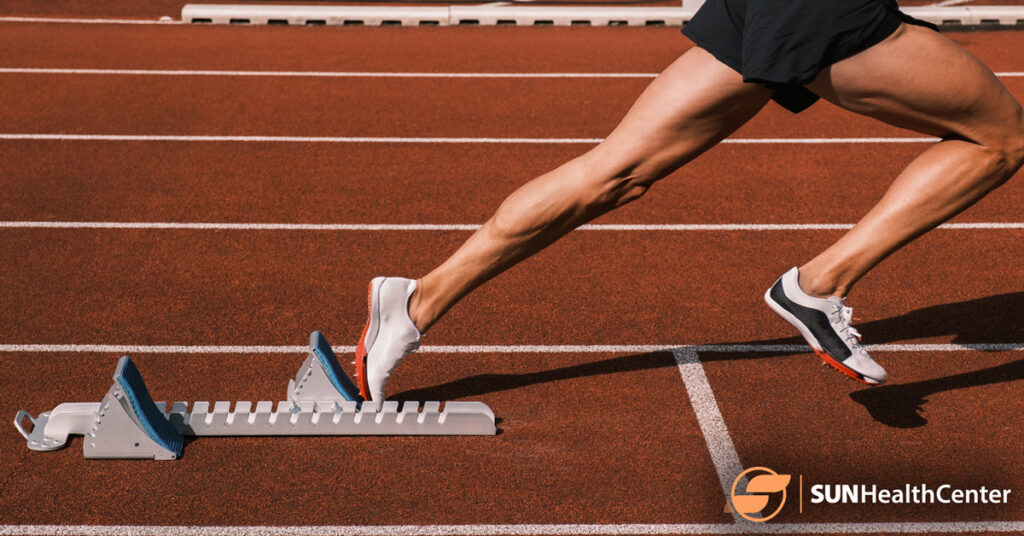
What’s the difference between a good athlete and a great athlete? A split second. The top performers in their sport are capable of moving faster, anticipating the next step and forward thinking. Consider a sprinter who takes off the second the start gun fires or a hockey player who moves swiftly when the puck drops, giving their team the advantage. Athletes know reaction time improvement is the key to getting a leg up on the competition.
A lot goes into reaction time improvement, and this is a heavy focus of athletic training routines. One avenue for improvement in sports that’s now available is neuro therapy. Find out whether it’s possible to improve reaction time through neuro therapy and how this treatment works.
What Is Neuro Therapy?
Neuro therapy, sometimes called neurofeedback, is a therapy technique used to change brain function in some way. It’s most commonly used to help manage mood disorders, treat addiction or improve cognitive performance. It’s considered a safe and effective form of mental health treatment, with a 75%-80% success rate.
Neuro therapy combines neurofeedback and neuromodulation treatments to work on mentally controlling your physical body, ultimately enhancing your athletic performance. This is neuro therapy administered for reaction time improvement and enhanced performance. Treatments are customized specifically based on your goals and the performance barriers you’re currently facing. Neuro therapy works to improve your physical performance as an athlete by targeting the autonomic nervous system and your brain function to better manage heart rate, breathing and other bodily responses. This can include breath and heart rate variability training or stimulation of certain areas of your brain through electromagnetics.
Reaction Time Improvement Through Neuro Therapy
Can reaction time be improved through neuro therapy? Data suggests athletes can improve their physical performance by investing time in mental programs like neuro therapy. In the context of studies and meta-analyses on reaction time improvement through neuro therapy, reaction time refers to how long it takes a person to respond to a stimulus from the moment they perceive it. Neuro therapy benefits a person’s detection, processing and response times.
After a session of neuro therapy, patients receive an electroencephalogram (EEG). This test measures the brain’s level of electrical activity through the use of electrodes and is used to confirm the success of the training session.
Case Studies on Neuro Therapy and Neurofeedback for Athletes
A 2020 research paper published in the Official Journal of ISNR examined an experiment with 45 subjects. These subjects were a mixture of athletes and nonathletes. The athletes undertook 12 neurofeedback training sessions, while nonathletes went through 15 of these same 25-minute sessions. Interestingly, while the neurofeedback affected both groups, only the athletes demonstrated improved physical performance.
A 2022 meta-analysis concluded that training neurofeedback increased performance for athletes by improving cognitive performance and reducing their reaction times. The meta-analysis suggests the most effective option for reducing athlete reaction times is to introduce a training protocol with neurofeedback consisting of 18 training sessions with a 45-minute duration.
Neuro Therapy as Part of Training
Neuro therapy can be and is being integrated into athletes’ training regimens worldwide. The benefits of this type of training are becoming well-known and include:
- Improved emotional stability during competition
- Ability to learn faster
- Improved sleep ability
- Enhanced productivity
- Better focus/concentration
These are just some of the positive results athletes like Olympic skiers and members of the United States military see after completing a number of neuro therapy sessions prescribed based on their goals.
Other Techniques for Reaction Time Improvement
In conjunction with neuro therapy, athletes can use various other techniques to improve their reaction times on the field, track or arena. Proven techniques to improve a response time to stimuli are:
- Practicing plyometric exercises
- Doing physical drills
- Learning a new skill or language (to stimulate the brain)
- Mindfulness exercises (e.g., meditation, yoga)
- Getting enough sleep
The adage “practice makes perfect” really is true when it comes to reaction time improvement for athletes. A 2018 report found that when you learn stimuli through repetition, you remember them and retain them longer. That’s why one of the best things athletes can do to hone their craft is to keep working at it.
How Neuro Therapy Could Impact the Future of Sports
Neuro therapy could permanently alter how athletes train for games, events and service. Right now, athletes across the United States are using neuro therapy to prepare for Olympic events or improve their performance in the military field. Depending on what results athletes want to see, they can talk to our practitioners about stimulating a specific area of the brain. For example:
- The motor cortex section of the brain: Targeting this area of the brain with neuro therapy and neuro-modulation can benefit athletes like skiers or gymnasts who want to improve their concentration.
- The prefrontal cortex area of the brain: Neurofeedback sessions targeting this area of the brain can be helpful to athletes who are nervous in a competition setting or just getting back into their sport following an injury because it boosts self-confidence. This is the most evolved area of the brain and where stress has a significant impact.
- The left dorsolateral prefrontal cortex of the brain: Focusing neuromodulation on this area of the brain is useful for athletes who need to learn new skills quickly.
With the ability to evaluate where an athlete needs to improve and how to stimulate the brain to attain that performance, there’s no limit to what people who train using neuro therapy can achieve.
Try Neuro Therapy in Florida
At Sun Health Center, we can work with you to create a neuro therapy training plan that works for your body and schedule. Athletes can take advantage of our peak performance model and see results after a session through an EEG. We also offer neuro therapy to support recovery from addiction, traumatic brain injuries and mental health conditions. Call us today to learn more.
